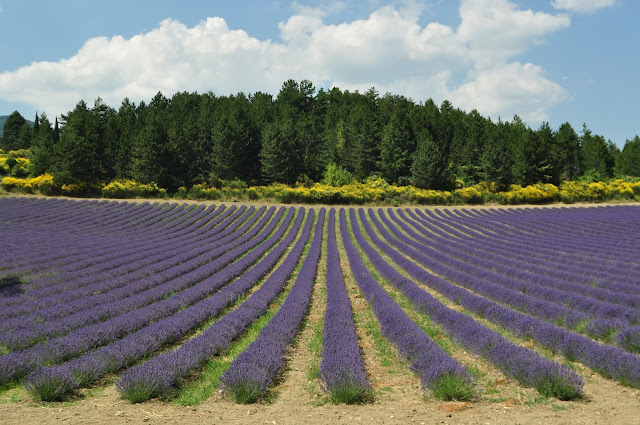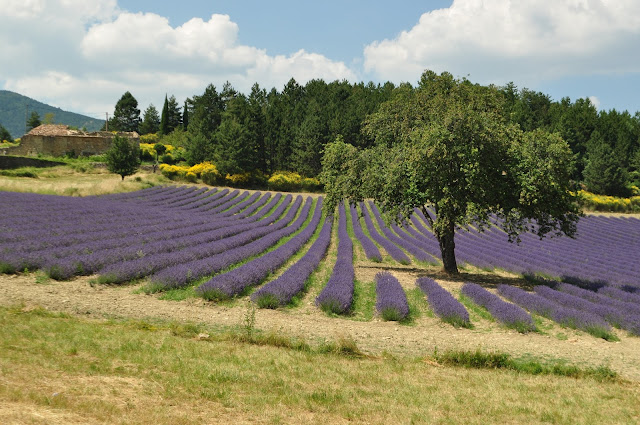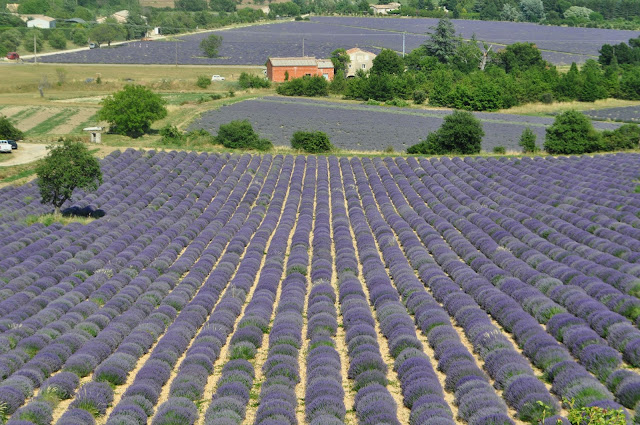It's a toss up between
coquelicots (red poppies) and lavender but probably no other scent or sight says Provence better than the pungent aroma of a purple field of lavender growing in mounded rows under a brilliant blue summer sky.
We were lucky that it was lavender season when we were in Sablet last summer with our daughter Tricia, husband Alvin and grandkids Avery and Caedon. The pictures which follow show the lavender fields we found during outings to the Drôme Provençale area west of Nyons, the Sénanque Abbey and to Sault.
Three species of lavender grow in Provence: true lavender (lavande) is found high up in dry, rocky soil. Aspic which grows lower down is similar to lavande except it has broader leaves and its branches hold a number of stems. And less refined, lavandin is a hybrid of lavande and aspic.
Lavande is most highly regarded by perfume makers for its sweet essential oils, though aspic and especially lavandin are more productive and therefore more common - ending up in laundry and household products.
 |
| Lavender field in the Drôme Provençale |
 |
| Me and my love in a lavender field in the Drôme Provençale |
 |
| Alvin and Tricia in a lavender field in the Drôme Provençale |
The
Sénanque Abbey is a beautiful Cistercian abbey located in the deep Senancole valley a short distance north of Gordes and well worth a visit anytime you are in the area. But the best time to go is when the lavender fields that stretch out from the Abbey are in full bloom.
The Sénanque Abbey was founded in 1148 under the patronage of Alfant, bishop of Cavaillon, and Raymond Berenger II, Count of Provence, by Cistercian monks who came from Mazan Abbey in the Ardeche. In the 13th and 14th centuries, the Abbey reached its greatest height, operating four mills, seven granges and possessing large estates in Provence
During the Wars of Religion, the quarters for the lay brothers were destroyed and the Sénanque Abbey was ransacked by Huguenots. At the French Revolution, the Abbey's lands were nationalized, the one remaining monk was expelled and Sénanque itself was sold to a private individual.
The site was repurchased in 1854 for a new community of Cistercian monks of the Immaculate Conception, under a rule less stringent than that of the Trappists. The community was expelled in 1903 and departed to the Order's headquarters, Lerins Abbey on the island of St. Honorat, near Cannes. A small community returned in 1988.
 |
| Sénanque Abbey |
The Sénanque Abbey is an active community with a handful of elderly monks. The monks grow the lavender and tend to honey bees to earn income for living and upkeep of the Abbey.
 |
| Lavender field near Sénanque Abbey |
The Sénanque Abbey along with two other early Cistercian abbeys in Provence, Silvacane Abbey and Le Thoronet Abbey, are sometimes referred to as the "Three Sisters of Provence"
 |
| Sénanque Abbey |
 |
| Lavender field near Sénanque Abbey |
 |
| Lavender field on the way to Sault |
 |
| Lavender fields on way to Sault |
 |
| Lavender field on way to Sault |
 |
| Lavender field on way to Sault |
 |
| Lavender field on way to Sault |
 |
| Lavender field on way to Sault |
 |
| Lavender field on way to Sault |
 |
| Lavender field on way to Sault |
 |
| Lavender field on way to Sault |
 |
| Lavender field on way to Sault |
 |
| Lavender field on way to Sault |
 |
| Lavender field on way to Sault |
 |
| Lavender field on way to Sault |
 |
| Lavender field on way to Sault |
 |
| Lavender field on way to Sault |
 |
| Another view of same lavender field |
 |
| Lavender field near Sault |
 |
| View of the patchwork of lavender fields visible from Sault |
Sault is an old fortified village that sits on a ridge overlooking a large valley dotted with lavender fields about one hour from Sablet. The name Sault comes from "Saltus" referring to the forests that covered the area.
 |
| Lavender field below Sault |
 |
| Lavender field near Sault |
 |
| Lavender field near Sault |
 |
| Shirley in lavender field near Sault |
 |
| Lavender field near Sault |
 |
| Lavender fields near Sault |
 |
| Lavender fields with Sault in distance |
 |
| Close up of previous lavender field near Sault |
We don't get to be in Sablet during the summer every year so we miss out on the lavender most years, which is obviously a mistake.

































GORGEOUS! And those views from afar are breathtaking!
ReplyDeleteYou are so right. We really hit it right this year and were able to see the lavender in its full glory. Magnifique!
DeleteRelaxing
ReplyDelete